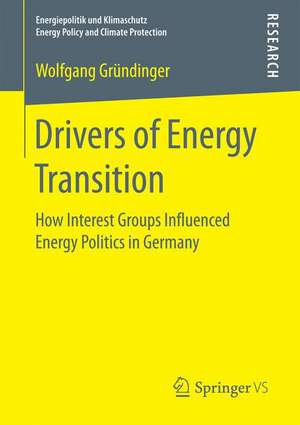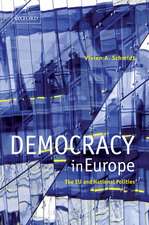Drivers of Energy Transition: How Interest Groups Influenced Energy Politics in Germany: Energiepolitik und Klimaschutz. Energy Policy and Climate Protection
Autor Wolfgang Gründingeren Limba Engleză Paperback – 27 mar 2017
Din seria Energiepolitik und Klimaschutz. Energy Policy and Climate Protection
- 15%
 Preț: 484.12 lei
Preț: 484.12 lei -
 Preț: 352.25 lei
Preț: 352.25 lei -
 Preț: 385.47 lei
Preț: 385.47 lei -
 Preț: 347.25 lei
Preț: 347.25 lei -
 Preț: 391.02 lei
Preț: 391.02 lei -
 Preț: 278.64 lei
Preț: 278.64 lei -
 Preț: 461.50 lei
Preț: 461.50 lei -
 Preț: 318.29 lei
Preț: 318.29 lei -
 Preț: 420.58 lei
Preț: 420.58 lei -
 Preț: 430.79 lei
Preț: 430.79 lei -
 Preț: 463.41 lei
Preț: 463.41 lei -
 Preț: 388.90 lei
Preț: 388.90 lei - 15%
 Preț: 641.85 lei
Preț: 641.85 lei -
 Preț: 390.08 lei
Preț: 390.08 lei -
 Preț: 387.75 lei
Preț: 387.75 lei - 15%
 Preț: 515.30 lei
Preț: 515.30 lei -
 Preț: 420.97 lei
Preț: 420.97 lei -
 Preț: 483.55 lei
Preț: 483.55 lei -
 Preț: 421.93 lei
Preț: 421.93 lei -
 Preț: 420.97 lei
Preț: 420.97 lei -
 Preț: 419.21 lei
Preț: 419.21 lei -
 Preț: 458.61 lei
Preț: 458.61 lei - 15%
 Preț: 534.17 lei
Preț: 534.17 lei -
 Preț: 387.38 lei
Preț: 387.38 lei -
 Preț: 382.57 lei
Preț: 382.57 lei - 15%
 Preț: 527.66 lei
Preț: 527.66 lei -
 Preț: 458.19 lei
Preț: 458.19 lei -
 Preț: 394.29 lei
Preț: 394.29 lei -
 Preț: 424.43 lei
Preț: 424.43 lei -
 Preț: 437.12 lei
Preț: 437.12 lei -
 Preț: 424.99 lei
Preț: 424.99 lei - 15%
 Preț: 583.45 lei
Preț: 583.45 lei - 15%
 Preț: 530.58 lei
Preț: 530.58 lei - 15%
 Preț: 522.10 lei
Preț: 522.10 lei - 15%
 Preț: 581.33 lei
Preț: 581.33 lei - 15%
 Preț: 521.60 lei
Preț: 521.60 lei - 15%
 Preț: 446.27 lei
Preț: 446.27 lei - 15%
 Preț: 586.23 lei
Preț: 586.23 lei - 15%
 Preț: 544.81 lei
Preț: 544.81 lei -
 Preț: 353.51 lei
Preț: 353.51 lei -
 Preț: 480.44 lei
Preț: 480.44 lei -
 Preț: 423.84 lei
Preț: 423.84 lei - 15%
 Preț: 447.25 lei
Preț: 447.25 lei -
 Preț: 358.20 lei
Preț: 358.20 lei -
 Preț: 366.67 lei
Preț: 366.67 lei
Preț: 710.09 lei
Preț vechi: 835.40 lei
-15% Nou
Puncte Express: 1065
Preț estimativ în valută:
135.88€ • 142.22$ • 113.09£
135.88€ • 142.22$ • 113.09£
Carte tipărită la comandă
Livrare economică 31 martie-14 aprilie
Preluare comenzi: 021 569.72.76
Specificații
ISBN-13: 9783658176907
ISBN-10: 3658176903
Pagini: 657
Ilustrații: X, 657 p. 61 illus.
Dimensiuni: 148 x 210 x 34 mm
Greutate: 0.79 kg
Ediția:1st ed. 2017
Editura: Springer Fachmedien Wiesbaden
Colecția Springer VS
Seria Energiepolitik und Klimaschutz. Energy Policy and Climate Protection
Locul publicării:Wiesbaden, Germany
ISBN-10: 3658176903
Pagini: 657
Ilustrații: X, 657 p. 61 illus.
Dimensiuni: 148 x 210 x 34 mm
Greutate: 0.79 kg
Ediția:1st ed. 2017
Editura: Springer Fachmedien Wiesbaden
Colecția Springer VS
Seria Energiepolitik und Klimaschutz. Energy Policy and Climate Protection
Locul publicării:Wiesbaden, Germany
Cuprins
Interest Groups, Lobbying, and Advocacy Coalitions.- The Rise and Fall of Nuclear Power in Germany.- The EEG – Story of an Unlikely Revolution.- ’Clean Coal’ (CCS) – A Chance for Climate Protection?.- Emissions Trading: Europe’s Flagship for Climate Protection.
Notă biografică
Dr. Wolfgang Gründinger studied Political and Social Sciences at the University of Regensburg, the Humboldt University in Berlin and the University of California, Santa Cruz (UCSC), and attended the Oxford Internet Leadership Academy. Currently he works as an Advisor on Digital Transformation at the German Association of the Digital Economy (BVDW).
Textul de pe ultima copertă
Wolfgang Gründinger explores how interest groups, veto opportunities, and electoral pressure formed the German energy transition: nuclear exit, renewables, coal (CCS), and emissions trading. His findings provide evidence that logics of political competition in new German politics have fundamentally changed over the last two decades with respect to five distinct mechanisms: the end of ’fossil-nuclear’ corporatism, the new importance of trust in lobbying, ’green ’ path dependence, the emergence of a ’Green Grand Coalition’, and intra-party fights over energy politics.
Contents
The Rise and Fall of Nuclear Power in Germany
The EEG – Story of an Unlikely Revolution
’Clean Coal’ (CCS) – A Chance for Climate Protection?
Emissions Trading: Europe’s Flagship for Climate Protection
Target Groups
The Author
Dr. Wolfgang Gründinger studied Political and Social Sciences at the University of Regensburg, the Humboldt University in Berlin and the University of California, Santa Cruz (UCSC), and attended the Oxford Internet Leadership Academy. Currently he works as an Advisor on Digital Transformation at the German Association of the Digital Economy (BVDW).
Contents
The Rise and Fall of Nuclear Power in Germany
The EEG – Story of an Unlikely Revolution
’Clean Coal’ (CCS) – A Chance for Climate Protection?
Emissions Trading: Europe’s Flagship for Climate Protection
Target Groups
Academics, researchers, and students in the fields of Political and Social Sciences
Politicians in the fields of energy and climate politics, journalists
The Author
Dr. Wolfgang Gründinger studied Political and Social Sciences at the University of Regensburg, the Humboldt University in Berlin and the University of California, Santa Cruz (UCSC), and attended the Oxford Internet Leadership Academy. Currently he works as an Advisor on Digital Transformation at the German Association of the Digital Economy (BVDW).
Caracteristici
Publication in the field of social sciences? Includes supplementary material: sn.pub/extras

















